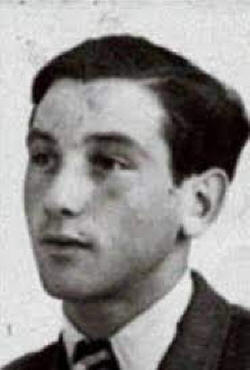

Partner Garner Franklin d'Mattos
 Tiemon Hofman (April 14, 1925 - 1997) was arrested in 1941 at 16-year-old
for homosexual acts and remained known as a homosexual with a criminal record
throughout his life. After years of struggle, he was officially recognized by
the Dutch state as a war prosecuted on the grounds of homosexuality and was
the only one to receive benefits for the fact that he had been persecuted in
World War II for his homosexuality. He took part in the Groningse gay subculture in Groningen of the fifties and sixties. Under the name Paul Monty he wrote gay rag novels, and published two editions of the gay magazine De Nichten (The Sissies).
Tiemon Hofman (April 14, 1925 - 1997) was arrested in 1941 at 16-year-old
for homosexual acts and remained known as a homosexual with a criminal record
throughout his life. After years of struggle, he was officially recognized by
the Dutch state as a war prosecuted on the grounds of homosexuality and was
the only one to receive benefits for the fact that he had been persecuted in
World War II for his homosexuality. He took part in the Groningse gay subculture in Groningen of the fifties and sixties. Under the name Paul Monty he wrote gay rag novels, and published two editions of the gay magazine De Nichten (The Sissies).
Tiemon Hofman was born in Groningen, Netherlands, the son of Hendrikus Theodoor Jaspers and Lubertha Lenstra. In her book Lifelong. Tiemon Hofman, homosexual and adventurer (2003), Judith Schuyf writes that Hofman was the illegitimate child of Bertha Lenstra and Henk Jaspers, a relationship that eventually fell through. When his mother was pregnant again, Tiemon was temporarily dropped off with her parents. Later he was given the name Hofman. At 16-year-old he has an homosexual encounter in a Groningen hotel with major consequences. Because the occupiers prohibited homosexual contact between men, the hotel owner warned the Germans who arrested Tiemon. He was convicted, which unjustly remained on his criminal record after the Second World War. As a result, he could not find steady work, although he could become a marine in the Indies, which left him with poor health. He only found recognition when he was an old man. The historian, affiliated with the Schorerstichting, regularly published on the 20th-century history of Dutch homosexuality and homosexuals. His lively biography, based on material by Tiemon himself, gave a good picture of his difficult life and of the homosexual subculture from 1940 to 1975, and gave a good impression of the discussion about the origin of homosexuality at the time.
In Germany, homosexuals were persecuted on a much larger scale during World War II. Homosexuality would be unnatural according to the National Socialists and homosexuals were considered enemies of the state. About 100,000 homosexuals were arrested there. The majority were sentenced to prison. In some cases, the death penalty was pronounced or homosexuals were castrated. Approximately 7,000 homosexuals ended up in concentration camps. Most did not survive. For a long time, for various reasons, the Dutch state did not want to acknowledge that homosexuals were also banned by National Socialism. The most obvious reason for this is homophobia. The influence of the conservative resistance on the memory of the war was very great for years. In the heroic perspective of God, queen and fatherland, "sissies" did not fit. This view was also held by many civil servants who had to judge any benefits to war victims. They didn't want to award anything to persecuted gays. After years of struggle, Hofman was only recognized by the state in 1990 as a persecuted person on the grounds of homosexuality. So far, he is the only gay man who has been recognized.
My published books: